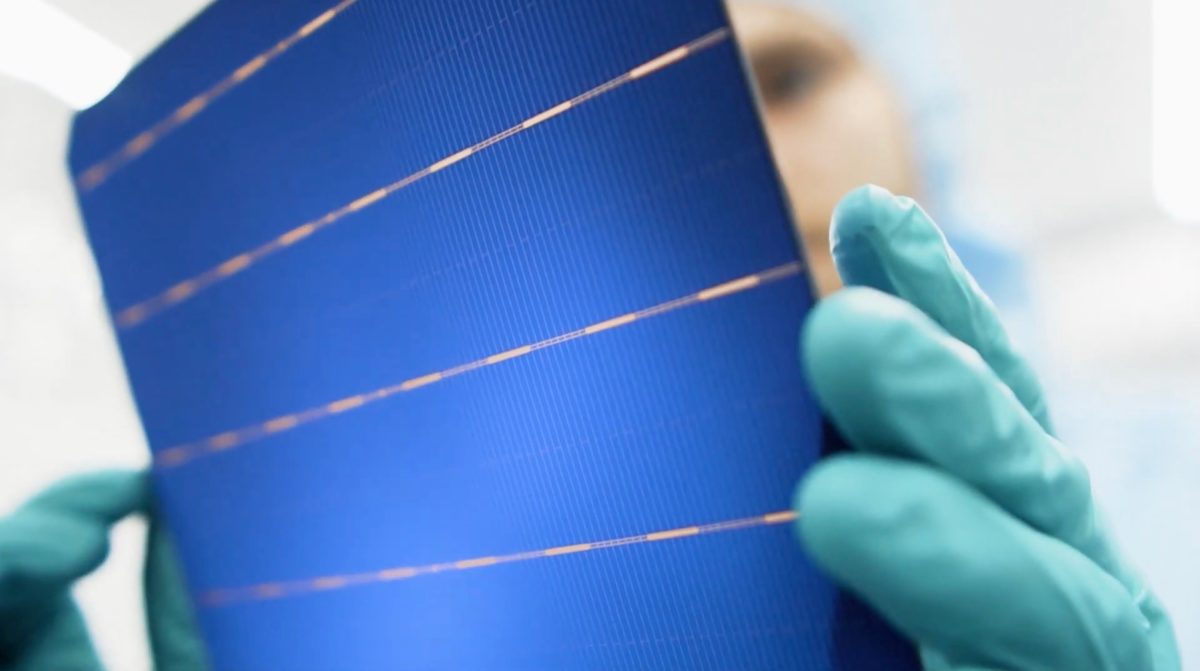In recent weeks it has been hard to find a silver lining amongst the Morrison Government’s gas-cloud of an energy policy. However, despite the government’s ongoing efforts to minimise clean energy funding while co-opting whatever funds are left for fossil fuels, it appears as if a silver lining has been spotted, ironically though it has been spotted on its way out.
That is because the silver lining in question is Aussie startup SunDrive, which has managed to break through one of the key barriers to broader adoption of next generation solar cells – namely, the expensive necessity of silver. SunDrive’s technology, which has today been supported by $3 million in funding from the Australian Renewable Energy Agency (ARENA), replaces the use of silver with the far more copious, and therefore less expensive, copper.
Worldwide, the manufacture of solar panels is estimated to use 20% of the globe’s yearly industrial silver consumption, a figure that is likely to rise as demand grows for the higher efficiency next-generation solar cell structures which require two to three times more silver per cell than their antecedents.
Interestingly, the cuprous substitution is not the limit of SunDrive’s innovation. Following on from SunDrive’s successful fabrication of Australia’s most efficient ever industrial-size solar cell in 2019, the startup is seeking to further improve efficiencies with a simpler manufacturing process and a thinner solar cell that will require less silicon.
This small-scale automated production line could prove instrumental in the development of long-term technology production in Australia.
Of course, none of these advancements just fell out of the sky, even if the solar energy they harness does. SunDrive’s technology began its development when its CEO, Vince Allen, was researching for his PhD at the University of New South Wales (UNSW) before founding the startup with his flatmate David Hu.
In the intervening years, SunDrive has been based in Wollongong, but now thanks to ARENA’s funding the startup is moving to Kirrawee in South Sydney to be closer other startups, researchers, investors. The funding means that SunDrive can up its staff by 10 and begin to properly scale its operations.
We have announced $3 million in funding to Australian startup @sundrive_solar to advance the commercial development of their low cost, high efficiency #solar manufacturing process in Australia https://t.co/JN5OVrbaJt pic.twitter.com/nPb1axyYZI
— Australian Renewable Energy Agency (ARENA) (@arenagovau) October 4, 2020
ARENA CEO Darren Miller noted the importance of continually evolving solar cell structures as Australia transitions its energy system. “It’s fantastic to see an Australian solar startup at the forefront of producing the next generation of high-efficiency solar cells,” said Miller. “Through technological innovations from startups like SunDrive, Australia will remain at the forefront of solar innovation and research and development for years to come.”
Start on the roof, work your way down
SunDrive’s initial focus is going to be the rooftop solar sector. Rooftop solar is the ideal place for SunDrive’s technology to enter into the market because the limited space allows the most efficient solar cells to shine the brightest, producing more energy for every square foot.
SunDrive expects these next generation cells to become even more inexpensive than today’s general cells and thus become useful for large-scale projects.
“With ARENA’s support we feel incredibly proud to be in a position to contribute to Australia’s rich heritage of advancing solar cell technology,” said Allen. “With this project we have an opportunity in Australia to lead the world in creating the best version of next generation solar cells. Our goal is to use the learnings from this project to bring to life a superior solar technology, creating new local industries which can compete on the global stage.”
“With only 3% of world electricity coming from solar today,” continued Allen, “there is still so much innovation that must occur.”
This content is protected by copyright and may not be reused. If you want to cooperate with us and would like to reuse some of our content, please contact: editors@pv-magazine.com.









7 comments
By submitting this form you agree to pv magazine using your data for the purposes of publishing your comment.
Your personal data will only be disclosed or otherwise transmitted to third parties for the purposes of spam filtering or if this is necessary for technical maintenance of the website. Any other transfer to third parties will not take place unless this is justified on the basis of applicable data protection regulations or if pv magazine is legally obliged to do so.
You may revoke this consent at any time with effect for the future, in which case your personal data will be deleted immediately. Otherwise, your data will be deleted if pv magazine has processed your request or the purpose of data storage is fulfilled.
Further information on data privacy can be found in our Data Protection Policy.